人教版初中英语九年级全一册语法知识点汇总
[全]人教版初中英语九年级全一册知识点归纳总结
![[全]人教版初中英语九年级全一册知识点归纳总结](https://img.taocdn.com/s3/m/c5e4e5df25c52cc58ad6be4a.png)
人教版初中英语九年级全一册知识点归纳总结Unit1 How can we become good learners?一、重点短语1. have conversation with sb. 同某人谈话2. too…to…太……而不能3. the secret to………的秘诀4. be afraid of doing sth./ be afraid to do sth. 害怕做某事5. look up 查阅6. repeat out loud 大声跟读7. make mistakes in 在……方面犯错误8. connect ……with…把……和……连接/联系起来9. get bored 感到厌烦10. be stressed out 焦虑不安的11. pay attention to 注意;关注12. depend on 取决于;依靠13. the ability to do sth.. 做某事的能力二、考点详解1. by + doing 通过……方式(by是介词,后面要跟动名词,也就是动词的ing 形式)2. talk about 谈论,议论,讨论The students often talk about movie after class. 学生们常常在课后讨论电影。
talk to sb= talk with sb 与某人说话3. 提建议的句子:①What/ how about +doing sth.? 做…怎么样?(about后面要用动词的ing形式,这一点考试考的比较多)如:What/ How about going shopping?②Why don't you + do sth.? 你为什么不做…?如:Why don't you go shopping?③Why not + do sth. ? 为什么不做…?如:Why not go shopping?④Let's + do sth. 让我们做…...吧。
九年级全一册英语知识点归纳

新人教版九年级英语全册知识点归纳Unit 1 How can we become good learners? 短语总结:1. good learners 优秀的学习者2. work with friends 和朋友一起学习3. study for a test 备考4.have conversations with 与……交谈5.speaking skills 口语技巧6.a little 有点儿7.at first 起初起先8.the secret to......,.......的秘诀9.because of 因为10.as well 也11.look up (在词典中等)查阅;抬头看12.so that 以便,为了13.the meaning of ……的意思14.make mistakes 犯错误15.talk to 交谈16.depend on 依靠依赖17.in common 共有的18.pay attention to 注意关注19.connect ……with ……把……联系。
20.for example 例如21.think about 考虑22.even if 即使尽管纵容23.look for 寻找24.worry about 担心担忧25.make word cards 制作单词卡片26.ask the teacher for help 向老师求助27.read aloud 大声读28.spoken English 英语口语29.give a report 作报告30.word by word 一字一字地31.so……that 如此……以至于32.fall in love with 爱上33.something interesting 有趣的事情34.take notes 记笔记35.how often 多久一次36.a lot of 许多37.the ability to do sth. 做某事的能力38.learning habits 学习习惯39.be interested in 对……感兴趣40.get bored 感到无聊41.be good at 在……方面擅长42.be afraid of 害怕43.each other 彼此互相44.instead of 代替而不是二.用法集萃1. by doing sth. 通过做某事2.it +be+adj+to do sth. 做某事是……的3.finish doing sth. 完成某事4.what about doing sth.?做某事怎么样?4.try to do sth. 尽力做某事 6.the +比较近,the+比较近越……,就越……7.find it+adj+to do sth. 发现做某事8. be afraid of doing sth. 害怕做某事9.help sb (to) do sth 帮助某人做某事10.practice doing sth 练习做某事11.keep doing sth 一直做某事12.be afraid to do sth 害怕做某事13.begin to do sth 开始做某事14.want to do sth 想要做某事15.need to do sth 需要做某事16.remember to do sth 记得做某事17.shoot 射(射着,射死等表结果)18.shoot at(瞄准)射书面表达(一)假如你是张晓华,下面是你的笔友李军给你写的一封电子邮件。
人教版新目标九年级全一册英语语法知识点复习提纲
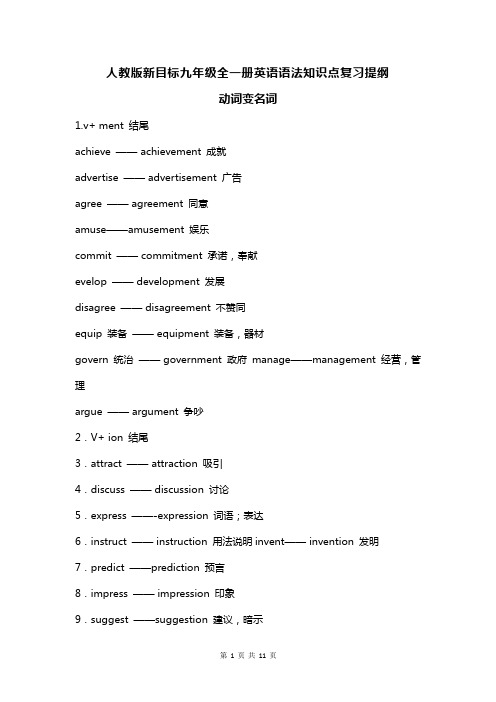
人教版新目标九年级全一册英语语法知识点复习提纲动词变名词1.v+ ment 结尾achieve —— achievement 成就advertise —— advertisement 广告agree —— agreement 同意amuse——amusement 娱乐commit —— commitment 承诺,奉献evelop —— development 发展disagree —— disagreement 不赞同equip 装备—— equipment 装备,器材govern 统治—— government 政府manage——management 经营,管理argue —— argument 争吵2.V+ ion 结尾3.attract —— attraction 吸引4.discuss —— discussion 讨论5.express ——-expression 词语;表达6.instruct —— instruction 用法说明invent—— invention 发明7.predict ——prediction 预言8.impress —— impression 印象9.suggest ——suggestion 建议,暗示10.educate —— education 教育11.graduate —— graduation 毕业12.operate —— operation 操作,动手术13.illustrate —— illustration 阐明,举例说明14.pollute —— pollution 污染15.introduce ——introduction 介绍16.organize ——organization组织17.imagine —— imagination 想象力18.inspire——inspiration 灵感,鼓舞人心的事19.invite —— invitation 邀请20.compete —— competition 竞争,比赛21.pronounce ——pronunciation发音22.admit —— admission 承认23.permit —— permission 允许24.conclude —— conclusion 结论25.decide —— decision 决定26.describe —— description描写,描绘27.resolve —— resolution 决心28.solve ——solution 解决方法3.V+ ance 结尾\1.allow —— allowance 允许2.appear —— appearance 外貌,出现3.perform —— performance 演出4.exist —— existence 存在5.V+ ing 结尾1.end —— ending 结尾,结局2.train ——training训练3.mean —— meaning 意义4.say—— saying 谚语5.remind —— reminding提醒6. bathe ——bathing沐浴6.词尾加-er或-or后变成表示“某一类人”的名词work——worker 工人7.teach——teacher老师8.sing——singer 歌手9.jump——jumper跳高运动员10.play——player表演者、运动员11.learn——learner 学习者12.visit——visitor访问者13.invent——inventor发明家7.V+ 其他8.beg——beggar 乞丐9.sit——seat 座位10.believe —— belief 信仰11.behave —— behavior 行为12.know—— knowledge 知识13.fly—— flight 飞行14.mix —— mixture 混合物15.press —— pressure 压力16.serve —— service 服务17.succeed ——success 成功18.pursue —— pursuit 追求,从事19.propose —— proposal 建议20.withdraw ——withdrawal 取钱;收回;撤退21.survive —— survival--survivor 幸存者22.arrive —— arrival到达23.analyze —— analysis 分析 2形容词变名词 1.词尾ent改为ency或ence24.efficient有效率的——efficiency 效率patient——patience/impatience 耐性/无耐心dependent——dependence依赖性independent——independence 独立性urgent——urgency 紧急25.2.ble结尾,ble改为bility26.possible—possibility 可能27.responsible—responsibility 责任;职责3.其他accurate—accuracy 准确性28.prosperous——prosperity 繁荣29.true——truth 真相30.wide——width 宽度31.long——length 长度32.high——height 高度 3名词/动词变形容词1.名词+y33.guilt 罪恶——guilty 内疚的34.health——healthy 健康的35.luck——lucky 幸运的36.cloud——cloudy 多云的37.wind—windy 多风的38.rain——rainy 多雨的39.snow——snowy 多雪的40.tourist —— touristy 游客多的er结尾,改er为ry hunger——hungry 饥饿的anger —— angry 生气的fog—— foggy 有雾的sun—— sunny 阳关灿烂的fur—— furry 毛皮的shine——shiny 发亮的taste —— tasty 美味的2.名词/动词+ ed以辅音+辅音结尾的单词,直接加edtalent —— talented 有天赋的offend ——offended 生气的crowd ——crowded 拥挤的以元音字母e结尾的单词直接加dbalance —— balanced 平衡的organize——organized 有组织的pollute ——polluted 被污染的please ——pleased 高兴的元音加辅音结尾的单词,词尾辅音双写再加edspot —— spotted 有斑点的3.名词+ ful/lesscare —— careful/ careless 小心的/ 粗心的help—— helpful / helpless 有帮助的/ 无助的use—— useful/ useless有用的/ 无用的meaning —— meaningful / meaningless有意义的/无意义的colour—— colourful /colourless多彩的/无色的pain 疼痛——painful /painless痛苦的/ 不痛的thank—— thankful / thankless 充满感激的/ 不知感恩的 peace 和平—— peaceful 和平的play游戏—— playful 爱玩耍的home —— homeless 无家可归的4.名词/动词+ able5.change —changeable 易变的6.adjust——adjustable 可调整的knowledge——knowledgeable 知识渊博的comfort—comfortable舒适的7.suit ——suitable 合适的动词以辅音加y结尾把y变i 加able ,deny—— deniable 可否认的rely—— reliable 可靠的4.名词+ ouscourage——courageous 勇敢的danger—— dangerous 危险的以y结尾,改y为i再加ousmystery 神秘—— mysterious 神秘的5.ce 变tconfidence—— confident 自信的difference——different 不同的6.dependence —— dependent 依赖他人的independence—— independent 独立的7.词尾加 aladdition—— additional 附加的,额外的music—— musical 音乐的person——personal (私人的)nation—— national 国家的education——educational有教育意义的tradition—— traditional 传统的origin起源——original 新颖的;独创的以元音字母e 结尾的单词,去掉词尾元音加al nature——natural 自然的globe—— global 全球的特例:class—— classical 经典的medicine 药——medical 医学的grammar—— grammatical 语法的8.名词+ lyfriend—— friendly 友好的live——lively 活跃的,有生气的love——lovely 可爱的week——weekly 每周的man——manly 男子气概的;强壮的9.词尾+ en10.wood—— wooden 木制的11.wool—— woolen 羊毛的10.表示方位的词11.East——eastern12.West——western13.outh——southern14.North——northern15.11.四大洲Asia 亚洲—— AsianAfrica 非洲——AfricanEurope欧洲—— EuropeanAmerica 美洲——American12.其他13.energy精力——energetic 精力充沛的strategy——strategic 战略的scientist——scientific 科学的fool 傻子——foolish 愚蠢的love——loving 慈爱的pleasure——pleasant令人愉快的/ pleased高兴的pride——proud 自豪的 4形容词变动词1.词尾加izemodern——modernize 使...现代化social——socialize 使...社会化2.词尾加enfast——fasten 使固定;集中于short—— shorten 缩短wide——widen 放宽less——lessen 使...减少特例(有变形):long——lengthen 使延长strong ——strengthen 加强;巩固3.词前加enlarge ——enlarge 扩大;放大 5形容词变副词1.形容词+ ly bad——badly 坏地bright——brightly 明亮地casual——casually 随意地cl ear——clearly 清楚地complete——completely 完全correct——correctly 正确地final——finally 最后fortunate——fortunately幸运地general——generally 一般来讲loud——loudly 大声地particular ——particularly特别地polite——politely 礼貌地proper ——properly适当地main——mainly 主要地most ——mostly 多半,大多数normal——normally 正常地quick——quickly 迅速地quiet——quietly 轻轻地,安静地real——really 真正地recent ——recently 最近;近来sad——sadly 悲哀地slow——slowly 缓慢地special——specially 专门,特殊地specific——specifically 特定地,明确地strong——strongly 坚决地,强烈地sudden——suddenly突然usual——usually 通常2.以le 结尾的,去e + yfortable——comfortably 舒服地gentle——gently 温柔地possible——possibly 可能地simple——simply 仅仅;只;简单地terrible——terribly 非常;极度地4.辅音字母+ y 变y为 ily5.easy——easily 容易地6.heavy——heavily 沉重地7.happy——happily 快乐地4.特殊good——well好地true——truly 真实地第11页共11页。
人教版初中英语九年级全册语法知识点思维导图

`how引导的特殊疑问句by+doing sthThe+比较级,the+比较级It's+形容词+for sb to do sth Sb find it+形容词+to do sth 固定搭配的用法finish doing sth/t 「y to do sthwhat引导的感叹旬What+ (a/an)+ad」+名词(+主话+谓语+其他)lHow+ad」/adv+主语+谔语+其他l情态动词wou ld 、could 的用法Could you please tell me how to get to the post office ?Section A How I Learned to Learn EnglishSection B How Can You Become a Successful Learner?Section A Full Moon,Full FeelingsSection B The Spirit of ChristmasSection A Fun T imePark-Always a Fun TimeUnit1 How can we become good learners7Unit2 I think thatmooncakes are delicious!Unit3 Could you please tell me where the restrooms are?Could you please tell me where the 「estau「ants a「e?used to do 的用法I used to be af 「aid of the dark. 形容词最离级的用;the+序数词+最窝级+N 第几One of the/形容词性物主代词+N s 谓语用三单N o matter+whaVwhen/where 二whatever/whenever/whereverSection B Could You please (7)Section A From Shy Girl to Pop Sta「Section B He Studies Harder Than He Used T oSection A The Dificult Search for American Products in the USb e made from和be made of 的用法和区别般现在时的被动语态am/is/are+过去分词Section B Beauty 1n Common Thingssometi m e 一段时间sometimes有时some times几次sometime某个时候等饲语辨析be used by sb. 被某人使用—股过去时的被动语态was/we飞+过去分词常用的系动词有look,feel,be,become,get,turn,smell,taste,stay(保待),keep 等词的用法Section A AnAccidental InventionSection B Do You Know When BasketballWas Invented?r section A Mom Konws BestUnit4 I used to be afraid of the darkUnit5 What are the shirts made of?Unit6 When was it invented?Unit? Teenagers should be allowed to choose their own clothesalso 、创her 、too 的用法She is a sixteen-year-old girl 二She is sixteen yea 「s oldSection B Should I Be Allowed to Make My Own Decisions? IUnit8 It must belong to Carla.Section A Read the article and decide which might be the best titlesomething,anything,nothing, everything等不定代词There must be something visiting our home must, m ay, m ight, c ou l d,may,can't S ecti o n B Stonehenge---Can Anyone Exp固n Why It Is There?The d心onary must be mineSection A What Do You Feel Like Watching Today?Unit9 I like music that I can dance toSection A Read the following opinionsUnit10 You're supposed to shake hands.Unit11 Sad moviesmake me erUnit12 Life is full of the unexpected.Unit13 We'「e tr ying to save the earth!Section A The Shirt of a Happy Man,ection B The Winnin a函m Section A Life Is Full of the UnexpectedSection B Read the passageSection A Save the Sharks!Section A I RememberUnit14 I remember meeting all of vou in Grade7Section B Readthe passageI like music that I can dance toWe are supposed to stoo smokin g .it 是形式主语或形式宾语I was supposed toarrive at7:00make sb do/make sb adjSoft and quiet music makes me relax.I 过去完成时的逻用By the time I got outside,the bus had already leftI was about to go up to my of f ice when I decided to get a cof f ee firstHe used not to stay up late.清态动词的被动语态情态动词+be +动词的过去分词a d ifferent些基本句型的I凡固和使用I remember being avolunteer.。
人教九年级英语全一册重点语法总结
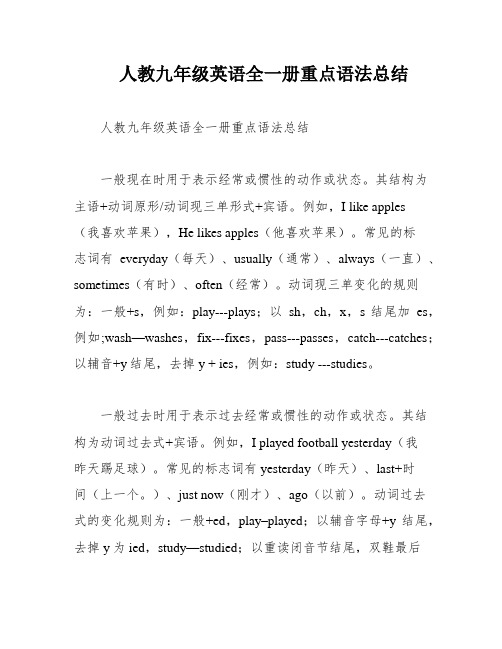
人教九年级英语全一册重点语法总结人教九年级英语全一册重点语法总结一般现在时用于表示经常或惯性的动作或状态。
其结构为主语+动词原形/动词现三单形式+宾语。
例如,I like apples(我喜欢苹果),He likes apples(他喜欢苹果)。
常见的标志词有everyday(每天)、usually(通常)、always(一直)、sometimes(有时)、often(经常)。
动词现三单变化的规则为:一般+s,例如:play---plays;以sh,ch,x,s结尾加es,例如;wash—washes,fix---fixes,pass---passes,catch---catches;以辅音+y结尾,去掉y + ies,例如:study ---studies。
一般过去时用于表示过去经常或惯性的动作或状态。
其结构为动词过去式+宾语。
例如,I played football yesterday(我昨天踢足球)。
常见的标志词有yesterday(昨天)、last+时间(上一个。
)、just now(刚才)、ago(以前)。
动词过去式的变化规则为:一般+ed,play–played;以辅音字母+y结尾,去掉y为ied,study—studied;以重读闭音节结尾,双鞋最后一个辅音字母节加ed(三明治结尾),—ped;以不发音的e结尾+d,move—moved。
现在进行时用于表示此时此刻正在进行的动作或状态。
其结构为Be(am,is,are)+动词ing(现在分词)。
例如,Heis reading,now(他现在正在阅读)。
常见的标志词有now(现在)、at the moment(此刻)、at once(立刻)、right away(立刻)。
现在分词(动词ing)的变化规则为:一般+ing,play—playing;以不发音e结尾,去掉e +ing,ride---riding;以重读闭音节结尾(三明治结尾),双鞋最后一个辅音字母+ing,—ping;以ie结尾,改为y+ing,例如:lie—lying,die—dying,tie—tying。
人教版九年级全一册英语Unit1单元语法知识点总结
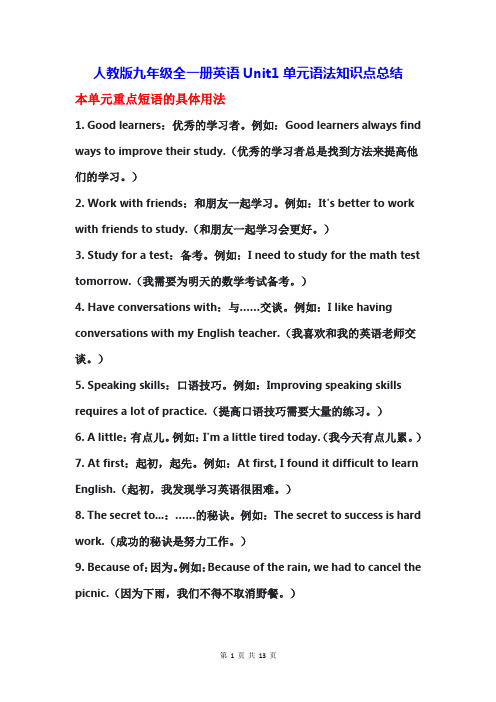
人教版九年级全一册英语Unit1单元语法知识点总结本单元重点短语的具体用法1. Good learners:优秀的学习者。
例如:Good learners always find ways to improve their study.(优秀的学习者总是找到方法来提高他们的学习。
)2. Work with friends:和朋友一起学习。
例如:It's better to work with friends to study.(和朋友一起学习会更好。
)3. Study for a test:备考。
例如:I need to study for the math test tomorrow.(我需要为明天的数学考试备考。
)4. Have conversations with:与……交谈。
例如:I like having conversations with my English teacher.(我喜欢和我的英语老师交谈。
)5. Speaking skills:口语技巧。
例如:Improving speaking skills requires a lot of practice.(提高口语技巧需要大量的练习。
)6. A little:有点儿。
例如:I'm a little tired today.(我今天有点儿累。
)7. At first:起初,起先。
例如:At first, I found it difficult to learn English.(起初,我发现学习英语很困难。
)8. The secret to...:……的秘诀。
例如:The secret to success is hard work.(成功的秘诀是努力工作。
)9. Because of:因为。
例如:Because of the rain, we had to cancel the picnic.(因为下雨,我们不得不取消野餐。
初中英语人教新目标九年级全册Unit 8—Unit 14语法知识点总结

九年级英语全册单元语法知识点Unit 8:It must belong to Carla.第八单元的语法重点是:情态动词表推测。
情态动词表推测情态动词 must,may,might,could,may,can 表示推测含义与用法后面都接动词原形,都可以表示对现在情况的揣测和推断但他们含义有所不同。
① must 一定,肯定(100%可能性)② may,might,could 有可能,也许(20%、80%可能性)③ can't 不可能,不会(可能性几乎为零)如:The dictionary must be mine.It has my name on it.The hair band can't be Bob's.After all,he is boy!【直击中考】1.【吉林长春】20.-Are the glasses Tim's?-No,they _______ be his.He doesn't wear glasses.A.mustB.canC.mustn'tD.can't2.【江苏宿迁】5.-Excuse me,is this the way to No.10 Middle School?-Oh,sory.I'm not sure.But it ______ be.A.mustB.shouldC.needD.mayUnit 9:I like music that I can dance to.第九单元的语法重点是:定语从句。
定语从句★定语从句:在复合句中,修饰某一名词或代词的从句叫做定语从句。
定语从句可以分为限制性定语从句和非限制性定语从句。
本单元主要学习由 who、that、which 引导的限制性定语从句。
★先行词:被定语从句所修饰的名词或代词称为先行词。
★关系代词:引导定语从句的关联词称为关系代词。
关系代词在定语从句中有三个作用:(1)引导定语从句;(2)代替先行词;(3)在定语从句中充当一个成分。
人教版九年级英语(全册)重点语法知识点复习梳理

人教版九年级英语(全册)重点语法知识点复习梳理人教版九年级英语重点语法知识点复习梳理一.介词by的用法(Unit-1重点语法)1.意为“在……旁”,“靠近”。
Some are singing and dancing under a big tree. Some are drawing by the lake.有的在大树下唱歌跳舞。
有的在湖边画画儿。
2.意为“不迟于”,“到……时为止”。
Your son will be all right by supper time.你的儿子在晚饭前会好的。
How many English songs had you learned by the end of last term?到上个学期末你们已经学了多少首英语歌曲?3.表示方法、手段,可译作“靠”、“用”、“凭借”、“通过”、“乘坐”等。
The monkey was hanging from the tree by his tail and laughing.猴子用尾巴吊在树上哈哈大笑。
The boy’s father was so thankful that he taug ht Edison how to send messages byrailway telegraph.孩子的父亲是那末的感谢,因而他教爱迪生怎样经由过程铁路电报来转达息。
4.透露表现“逐个”,“逐批”的意思。
One by one they went past the table in the dark.他们一个一个得在黑暗中颠末这张桌子。
5.表示“根据”,“按照”的意思。
What time is it by your watch?你的表几点了?6.和take , hold等动词连用,说明接触身体的某一部分。
I took him by the hand.我拉住了他的手。
7.用于被动句中,表示行为主体,常译作“被”、“由”等。
English is spoken by many people.英语被许多人说。
人教版初中英语九年级全一册语法知识点汇总

人教版初中英语九年级全一册语法知识点汇总动词1.被动语态(passive voice)(1)主动语态和被动语态英语动词有两种语态,即主动语态(active voice)和被动语态(passive voice)。
当主语为动作的执行者时,谓语的形式为主动语态;当主语为动作的承受者时,谓语要用被动语态。
【练习】:判断下列句子为主动句还是被动句,并找出该动作的执行者和承受者。
Many people speak English.Bell invented the telephone in 1876.English is spoken by many people.The telephone was invented by Bell in 1876.(2)被动语态的构成被动语态由“助动词be+及物动词的过去分词”构成。
助动词be有人称、数和时态的变化,其变化规则与be作为连系动词时完全一样。
现以动词ask为例,将一般现在时和一般过去时被动语态的肯定式、否定式及疑问式列表如下:(3)含有情态动词的被动语态含有情态动词的被动语态由“情态动词+ Be + 及物动词的过去分词”构成。
Your room must be cleaned every day.The trees may be planted behind the house.This game can be played in the winter.(4)被动语态的用法当我们不知道谁是动作的执行者、或者没有必要说明谁是动作的执行者,或者只需强调动作的承受者时,要用被动语态。
The blouse is made of silk.The zipper is often used in our daily lives.I think the TV was invented after the car.2.过去完成时(past perfect tense)*(1)过去完成时的构成:助动词had(用于各种人称和数) + 过去分词(2)过去完成时的用法过去完成时表示在过去某一时间或动作之前已经发生或完成了的动作。
人教版九年级全一册单元重点短语归纳总结(完整版)

人教版九年级全一册单元重点短语归纳总结Unit 1be born with… 天生具有……pay attention to… 关注……connect…with… 把……和……连接起来have a good knowledge of… 掌握……spoken English英语口语make mistakes/make a mistake 犯错,出错get the pronunciation right正确地发音join an English club参加一个英语俱乐部practice speaking English练习说英语by mistake错误地written English书面英语keep the secret保守秘密at a speed of… 以……的速度increase by… 增加了……increase to… 增加到……something important某件重要的事情by the way顺便问一下by accident = by chance偶然地by mistake错误地one by one一个接一个step by step一步一步地little by little逐渐地by the time… 到……为止by oneself独自地shake sb. by the hand和某人握手in English用英语in ink用墨水speak in a loud voice大声地讲in red穿红色的衣服find out… 查清楚……,弄明白……lost and found失物招领be interested in… 对……感兴趣take an interest in … 对……感兴趣enjoy oneself玩得开心,过得愉快pick up捡起,拾起,无意中学习到,接听look up向上看,查阅cut up切碎mix up混合give up放弃put up搭建;张贴take up开始做,占cheer up振奋起来Unit 2put on… 穿上……,增加……lay out排版,布置end up… 结束……at present目前,现在go…for one’s vacation去……度假enjoy doing sth.喜欢做某事eat out在外面吃five meals a day每天5顿饭in two weeks在两周之后sound like… 听起来像……from…to… 从……到……be similar to… 与……相似wash away… 洗掉……have good luck有好运气in the new year在新的一年里play a trick on… 戏弄……dress up化妆打扮dress up as… 打扮成…….care about… 关心……make money挣钱used to do sth. 过去常常做某事make plans to do sth. 制定计划做某事make a plan for… 制定……的计划The Spring Festival春节The Lantern Festival元宵节The Mid-Autumn Festival中秋节The Dragon Boat Festival端午节The Water Festival泼水节Christmas Day圣诞节April Fool’s Day愚人节put on… 增加(体重);发胖;穿上……throw ... at ... 朝……扔……throw away 扔掉Unit 3pass by… 通过……pardon me对不起,打扰一下parking lot停车场in a rush匆忙地,仓促地rush hour(交通)高峰期,拥堵时刻drive sb. into a corner逼得某人走投无路turn a corner拐过街角around the corner在拐角处, 在近处, 即将来到in the corner在角落里(在建筑物内部)on / at the corner在拐角处(在建筑物外部) make a request要求by underground坐地铁apart from… 除此之外……give up放弃give away捐赠give in屈服,投降give out分发It’s convenient to do sth. 做某事是便利的Unit 4from time to time有时deal with… 处理……,应付……be proud of… 为……感到自豪in person亲自take pride in… 为……感到自豪look after… 照顾……take after… 长得像……agree with… 同意……compare…with… 把……和……比较take care of… 照顾……look for… 寻找……look up向上看;查阅look into… 调查……worry about… 担心……think of… 想……,认为……pay attention to… 关注……look forward to… 盼望……a sense of humor幽默感in silence沉默,安静keep silent保持安静help sb. with sth. 帮助某人某事help sb. do/to do sth. 帮助某人做某事with one’s help = with the help of sb. 在某人的帮助下have influence on sth. = have an effect on sth.对……由影响take up开始,从事,接纳,占据,继续做take off起飞,脱下,动身take on承担,呈现take over接受,接管,借用,接办take down记下,取下take place发生,进行,举行take a look看一下take a walk散步take away带走,拿走,取走take care of… 照顾……,注意……,抚养……take charge掌管,负责be absent from… 缺席……in general = generally总体上generally speaking 总而言之,总的来说deal with… 应对……,处理……a big thing 一件大事情get tons of attention被众人所关注tons of sth.很多,极多personally speaking就个人而言Unit 5no matter… 无论……even though即使by hand用手seat belt安全带see a film看电影watch the movies看电影read a book看书,读书as long as… 只要……as soon as… 一……就……as far as… 和……一样远;根据……as well as… 也;又;和have sth. in common有……共同之处in trouble陷入麻烦in style时髦地instead of… 代替……,而不是……as for… 至于……private cars私家车try one’s best to do sth.尽力做某事in fact事实上according to… 根据……such as… 诸如……,例如……be made of…(原材料) 由……制成的(看得出原材料)be made from…(原材料) 由……制成的(看不出原材料)be made by sb. 被某人制成be made in…(地点) 在哪里制成be made into… (制成品) 被制成……be known / famous as… 作为……而出名be known / famous for… 因……而著名be known to… 为……所知/熟知turn…into… 把……变成……;使……变成……leave for… 出发到某处avoid doing sth. 避免做某事Unit 6take place发生without doubt毫无疑问all of a sudden突然by mistake错误地divide…into… 把……分成……on purpose故意地look up to… 仰视……be similar to… 与……相似the same as… 与……相同be different from… 与……不同so far到目前为止clean up大扫除set up建立go off(闹钟等)响起get off… 下车……get on… 上车……translate…into… 把……翻译成……with pleasure我的荣幸;不客气have a point有道理be used for doing sth. 被用来做某事think about… 考虑……,想起……think of… 考虑……,记忆……,记起……think sth. over 仔细想,审慎思考,作进一步考虑think sth. out 想通,想出,熟思There is no doubt that+句子毫无疑问divide… into… 把……分开,分散look back回头看,回顾look down upon (on)… 看不起……,轻视……look forward to… 盼望……,期待……look into… 朝......看去,调查……look like… 看上去像……look on… 旁观……,观望……look out当心,小心,留神look through… 浏览……,透过......看look up查阅,抬头看Unit 7take it easy放轻松in general大体上thousands of… 数以千计的……as soon as possible尽可能快be willing to… 乐意……quite a few相当多dream of/about… 梦想……hold on to… 坚持……come true实现have a chance有机会have a cold感冒have the flu患流感invite sb to do sth. 邀请某人去做某事fix up修理I hope so/not.我希望如此/不这样make up编造;捏造;化妆dress up穿衣打扮have to do with… 与……无关take the place of… 取代……No way! 不,决不,没门give sb. a hug拥抱某人give sb. a lift让某人搭便车talk back回嘴,顶嘴,顶撞talk about… 谈论……,谈到……talk over…商议……talk to…与……说话talk with…和……交谈talk to oneself自言自语stay out不回家,避开get in the way of… 挡……的路,妨碍in a way (= in one way/in some ways)从某一角度看,在某种程度上in the way挡路on one’s way (to…) 在去……的路上in no way决不(置于句首,句子要倒装)by the way顺便问make a choice做出选择have no choice but to do sth. 除了做某事以外,别无选择或只好做某事choose to do sth. 选择做某事provide sb. with sth. 提供某人某物provide sth. for sb. 提供某物给某人offer sb. sth. 提供某人某物offer sth. to sb. 提供某物给某人offer to do sth. 提供做某事Unit 8give out分发clean up大扫除put off推迟;拖延set up建立think up想出,想到take after… 长得像……fix up修理give away捐赠put up搭建,张贴ask for… 要求……hand out分发work out解决help (sb.) out帮助(某人)走出困境at once立刻,马上at that time在那时at the same time同时from time to time有时on time准时all the time一直,总是once upon a time很久以前search for… 寻找……belong to… 属于……have fun doing sth. 做某事玩得愉快=have a good time doing sth.=enjoy doing sth.prevent sb. from doing 阻止某人做某事= stop sb. from doingUnit 9in that case那样的话,在那种情况下stick to… 坚持……plenty of… 大量……,许多……shut off… 关闭……once in while 偶尔look up查阅in total总计try one’s best to do sth.尽力做某事at first首先at least至少at most至多part with… 放弃……,卖掉……,交出……prefer (doing) sth. to (doing) sth. 比起……更喜欢……prefer to do sth. 宁愿做某事prefer to do sth. rather than do sth. 宁愿做……而不愿做……shut up 闭嘴in a sense在某种程度上be popular with/ among… 深受……的欢迎Unit 10drop by顺便拜访after all毕竟,终究get mad生气make an effort努力clean… off 清除……take off起飞go out of one’s way 格外努力make… feel at home使……宾至如归get used to doing sth. 习惯于做某事expect to do sth. 期待做某事find out弄清楚hang out闲逛check out退房eat out外出吃饭be supposed to do sth. 应该……,被期望做……drop by… 顺便拜访……,随便进入……above all最重要,首先after all毕竟,别忘了at all丝毫,根本first of all首先in all总共make an effort to do sth. 努力做某事go out of one’s way 特地,格外努力Unit 11drive sb. crazy/mad把某人弄疯了the more…the more… 越怎么样就越怎么样be friends with (sb.) 和某人成为朋友leave out遗漏call in… 叫来……neither… nor… 既不……也不……to start with首先kick sb. off使某人离开;开除be hard on sb.对某人苛刻rather than… 并非……,而不是……pull together团结起来search for… 寻找……even though即使return to… 归还……as a result作为结果in fact事实上such as… 诸如……more than… 超过……come up with… 提出……,想出……get on with… 和……相处would rather do sth. than do sth. 宁愿做某事而不愿做某事= prefer to do sth. rather than do sth.drive sb. crazy/mad 使某人发疯/发狂Why don’t you + do sth.? = Why not + do sth.? 为何不……?be /feel left out被遗忘,被忽略,被冷落feel like doing sth. = want to do sth. 想要做……keep one’s eyes on sth. 盯着……keep an eye on… 留意……,照看……kick sb. off sth. 使某人离开,开除,逐出be hard on sb.对……很严厉,要求很苛刻;苛待(为难)某人Unit 12give…a lift给某人搭便车by the time (that)… 在……以前;到……时候为止in line with… 与……并驾齐驱show up炫耀by the end of… 截至……costume party化妆舞会sell out卖光keep doing sth. 一直做某事stay up熬夜grow up长大wake up醒来pay for… 支付……ask for… 要求……go out出去go away离开go over复习rush out of… 从……冲出去,冲出……even though 即使,虽然,尽管in disbelief不相信,疑惑,怀疑take off 脱掉,起飞,(事业)走红play jokes/a joke on… 戏弄……play a trick / tricks on sb. 捉弄某人make fun of… 捉弄……,取笑……make fool of… 愚弄……,戏弄……laugh at… 嘲笑……get married to sb.嫁/娶某人,与某人结婚Unit 13make a difference起作用be harmful to… 对……有害take part in… 参加……turn off… 关闭……turn on… 打开……turn up… 调高……;出现……turn down关小,拒绝throw away扔掉put sth. to good use 充分利用pull ... down拆掉……,摧毁……upside down上下翻转bring back使记起,恢复try to do sth. = try one’s best to do sth. 努力去做某事be related to… 与……有关play a part in 在……方面起作用,在……中扮演角色make a difference (to…) (对……) 产生影响或作用be harmful to doing sth. = do harm to doing sth. 对……有害at the top of … 在……最高地位,用最高(大)的(速度,声音等) turned upside down被翻转过来的,被颠倒过来的Unit 14in a row连续几次地help sb. with sth. 帮助某人干某事=help sb. do sth./ help sb. to do sth.help oneself 自助,(进餐时) 自己取用can’t help doing sth. 禁不住做某事with the help of… 在……的帮助下degree of………的程度,……的学位in one’s degree按照其本身的情况(或程度)to a degree在某种程度上,在一定程度上,非常to some degree在某种程度上有点,稍微believe in信任,信赖(=trust in / on)look forward to doing sth. 希望/期望做某事set out出发,开始,陈述set about sth./doing sth. 着手做某事set off动身,出发,燃放(鞭炮等),使……爆炸或发出响声set up竖起来,支起来,建立,成立set aside放在一边,搁置,存蓄,留下。
初中英语人教版九年级全一册所有重点单词、短语和句型全汇总
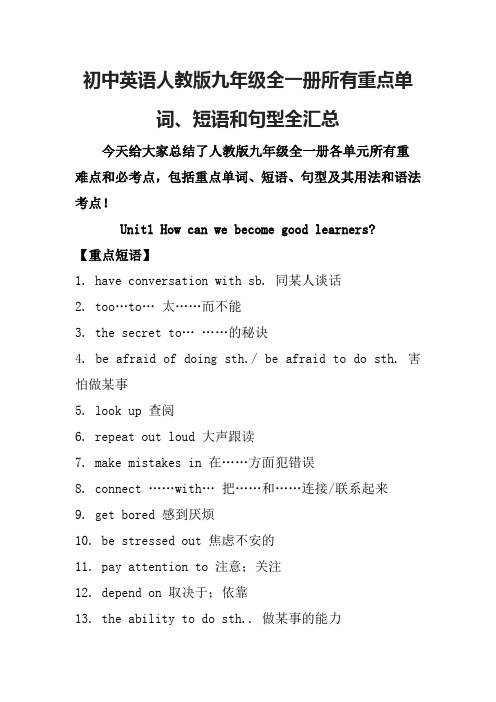
初中英语人教版九年级全一册所有重点单词、短语和句型全汇总今天给大家总结了人教版九年级全一册各单元所有重难点和必考点,包括重点单词、短语、句型及其用法和语法考点!Unit1 How can we become good learners?【重点短语】1. have conversation with sb. 同某人谈话2. too…to…太……而不能3. the secret to………的秘诀4. be afraid of doing sth./ be afraid to do sth. 害怕做某事5. look up 查阅6. repeat out loud 大声跟读7. make mistakes in 在……方面犯错误8. connect ……with…把……和……连接/联系起来9. get bored 感到厌烦10. be stressed out 焦虑不安的11. pay attention to 注意;关注12. depend on 取决于;依靠13. the ability to do sth.. 做某事的能力【考点详解】1. by + doing 通过……方式(by是介词,后面要跟动名词,也就是动词的ing形式)2. talk about 谈论,议论,讨论The students often talk about movie after class. 学生们常常在课后讨论电影。
talk to sb= talk with sb 与某人说话3. 提建议的句子:①What/ how about +doing sth.? 做…怎么样?(about后面要用动词的ing形式,这一点考试考的比较多)如:What/ How about going shopping?②Why don't you + do sth.? 你为什么不做…?如:Why don't you go shopping?③Why not + do sth. ? 为什么不做…?如:Why not go shopping?④Let's + do sth. 让我们做…...吧。
人教版初中英语九年级全册语法知识点汇总.docx
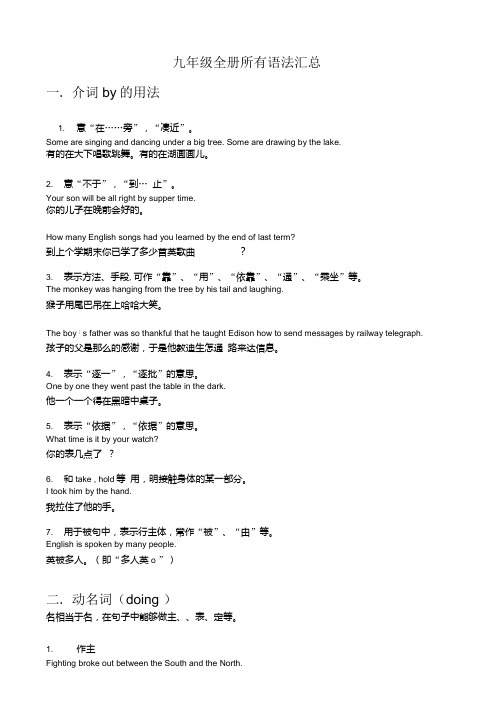
九年级全册所有语法汇总一. 介词by的用法1. 意“在……旁”,“凑近”。
Some are singing and dancing under a big tree. Some are drawing by the lake.有的在大下唱歌跳舞。
有的在湖画画儿。
2. 意“不于”,“到… 止”。
Your son will be all right by supper time.你的儿子在晚前会好的。
How many English songs had you learned by the end of last term?到上个学期末你已学了多少首英歌曲?3. 表示方法、手段,可作“靠”、“用”、“依靠”、“通”、“乘坐”等。
The monkey was hanging from the tree by his tail and laughing.猴子用尾巴吊在上哈哈大笑。
The boy ; s father was so thankful that he taught Edison how to send messages by railway telegraph. 孩子的父是那么的感谢,于是他教迪生怎通路来达信息。
4. 表示“逐一”,“逐批”的意思。
One by one they went past the table in the dark.他一个一个得在黑暗中桌子。
5. 表示“依据”,“依据”的意思。
What time is it by your watch?你的表几点了?6. 和take , hold等用,明接触身体的某一部分。
I took him by the hand.我拉住了他的手。
7. 用于被句中,表示行主体,常作“被”、“由”等。
English is spoken by many people.英被多人。
(即“多人英o ”)二. 动名词(doing )名相当于名,在句子中能够做主、、表、定等。
人教版初中英语九年级全册各单元知识点、语法归纳整理
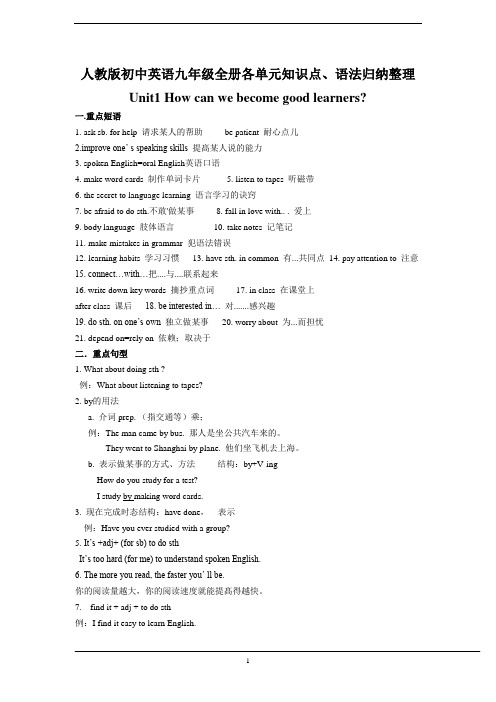
人教版初中英语九年级全册各单元知识点、语法归纳整理Unit1 How can we become good learners?一.重点短语1. ask sb. for help 请求某人的帮助be patient 耐心点儿2.improve one’ s speaking skills 提髙某人说的能力3. spoken English=oral English英语口语4. make word cards 制作单词卡片5. listen to tapes 听磁带6. the secret to language learning 语言学习的诀窍7. be afraid to do sth.不敢'做某事8. fall in love with.. . 爱上9. body language 肢体语言10. take notes 记笔记11.make mistakes in grammar 犯语法错误12.learning habits 学习习惯13. have sth. in common 有...共同点14. pay attention to 注意15. connect…with…把....与....联系起来16. write down key words 摘抄重点词17. in class 在课堂上after class 课后18. be interested in… 对.......感兴趣19. do sth. on one’s own 独立做某事20. worry about 为...而担忧21. depend on=rely on 依赖;取决于二.重点句型1. What about doing sth ?例:What about listening to tapes?2.by的用法a. 介词 prep. (指交通等)乘;例:The man came by bus. 那人是坐公共汽车来的。
人教版九年级英语全册知识点归纳
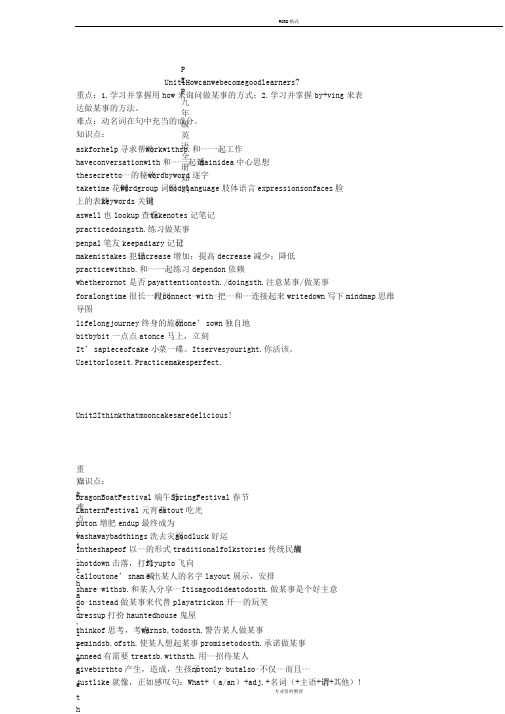
P E P 九年级英语全册知纳 Unit1Howcanwebecomegoodlearners? 重点:1.学习并掌握用how 来询问做某事的方式;2.学习并掌握by+ving 来表 达做某事的方法。
难点:动名词在句中充当的成分。
知识点: askforhelp 寻求帮助w orkwithsb.和⋯⋯一起工作 haveconversationwith 和⋯⋯一起对话mainidea 中心思想thesecretto ⋯⋯的秘诀w ordbyword 逐字 taketime 花时间w ordgroup 词组b odylanguage 肢体语言expressionsonfaces 脸上的表情k eywords 关键词aswell 也lookup 查看t akenotes 记笔记 practicedoingsth.练习做某事 penpal 笔友keepadiary 记日记makemistakes 犯错i ncrease 增加;提高decrease 减少;降低 practicewithsb.和⋯⋯一起练习dependon 依赖whetherornot 是否payattentiontosth./doingsth.注意某事/做某事foralongtime 很长一段时间c onnect ⋯with ⋯把⋯⋯和⋯⋯连接起来writedown 写下mindmap 思维导图lifelongjourney 终身的旅程o none ’sown 独自地 bitbybit 一点点atonce 马上,立刻It ’sapieceofcake 小.菜一碟。
Itservesyouright.你活该。
Useitorloseit.Practicemakesperfect.Unit2Ithinkthatmooncakesaredelicious!重点&难点:1.that,if知识点:DragonBoatFestival 端午节S pringFestival 春节 LanternFestival 元宵节e atout 吃光 puton 增肥endup 最终成为 washawaybadthings 洗去灾祸g oodluck 好运intheshapeof 以⋯⋯的形式traditionalfolkstories 传统民间故事 shotdown 击落,打垮f lyupto 飞向 calloutone ’snam 喊e 出某人的名字layout 展示,安排 share ⋯withsb.和某人分享⋯⋯Itisagoodideatodosth.做某事是个好主意 do ⋯instead 做某事来代替playatrickon 开⋯⋯的玩笑 dressup 打扮hauntedhouse 鬼屋 thinkof 思考,考虑w arnsb,todosth.警告某人做某事 remindsb.ofsth.使某人想起某事promisetodosth.承诺做某事1Unit3Couldyoupleasetellmewheretherestroomare?重点:学习并掌握wh-&how 所引导的宾语从句。
人教版九年级语法总结
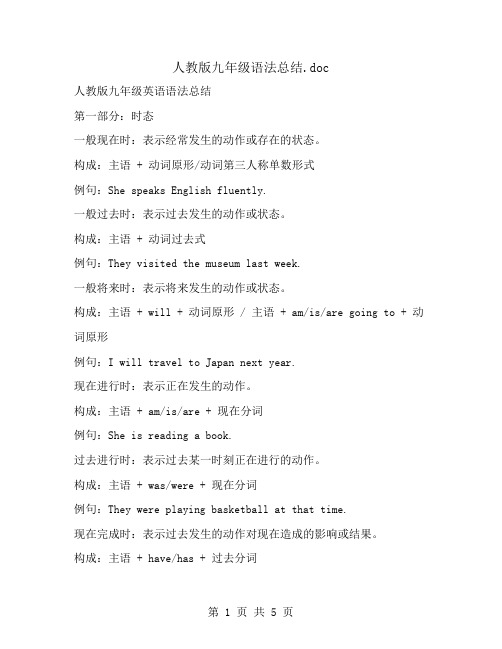
人教版九年级语法总结.doc人教版九年级英语语法总结第一部分:时态一般现在时:表示经常发生的动作或存在的状态。
构成:主语 + 动词原形/动词第三人称单数形式例句:She speaks English fluently.一般过去时:表示过去发生的动作或状态。
构成:主语 + 动词过去式例句:They visited the museum last week.一般将来时:表示将来发生的动作或状态。
构成:主语 + will + 动词原形 / 主语 + am/is/are going to + 动词原形例句:I will travel to Japan next year.现在进行时:表示正在发生的动作。
构成:主语 + am/is/are + 现在分词例句:She is reading a book.过去进行时:表示过去某一时刻正在进行的动作。
构成:主语 + was/were + 现在分词例句:They were playing basketball at that time.现在完成时:表示过去发生的动作对现在造成的影响或结果。
构成:主语 + have/has + 过去分词例句:I have finished my homework.过去完成时:表示过去的过去完成的动作。
构成:主语 + had + 过去分词例句:She had finished her homework before I called her. 将来进行时:表示将来某一时刻正在进行的动作。
构成:主语 + will be + 现在分词例句:He will be studying at that time.将来完成时:表示将来某一时间之前完成的动作。
构成:主语 + will have + 过去分词例句:We will have finished the project by next month. 第二部分:被动语态一般现在时被动语态:am/is/are + 过去分词例句:The letter is written by him.一般过去时被动语态:was/were + 过去分词例句:The house was built in 2010.一般将来时被动语态:will be + 过去分词例句:A new school will be built next year.现在完成时被动语态:have/has been + 过去分词例句:The problem has been solved.其他时态的被动语态:相应时态的构成+过去分词例句:The book was being read by her when I entered.第三部分:非谓语动词动名词:动词+ing,用作主语、宾语等。
人教版初中英语九年级全册-中考英语一轮复习语法知识点

初三全册语法知识点
Grade 9
Unit 1 How can we become good learners?
Verb +bywith gerund动词+by doing sth.动名词,通过…
◉短语动词
不及物动词+副词(其后不加宾语)
breakout爆发come up(计划、建议被)提出fall behind落后
3.一般将来时的被动语态:由“shall/will/be going to/be to be+过去分词”构成。shall用于第一人称,will用于各种人称
6.某些习惯用法中(有些习惯用法常以被动形式出现,强调存在的状态)
被动语态的习惯搭配
be determined to do决心做
be interested in对……感兴趣
be seated...坐好
be dressed in...穿着……
三、被动语态的常用句式
1.普通句式
(1)肯定句式:主语+be+过去分词+其他。
8.过去完成时的被动语态:由“had been+过去分词”构成
二.被动语态的用法
下列情况下通常使用被动语态。
1.不知道动作的执行者或虽然知道动作的执行者但没有必要说出时
2.当强调动作承受者时,常用by引出动作的发出者
3.当动作的执行者是无生命名词时
4.当动作的执行者是泛指或很模糊时
5.出于礼貌不便提及动作执行者时
be+过去分词”既可表示动作,也可表示状态,但“get+过去分词”只能表示动作。
Unit 6 When was it invented?
Passive voice (past tense)被动语态一般过去时
Units1-2单元高频考点总结2024-2025学年人教版英语九年级全册

九全1-2单元1.-How do you study for a test?你如何为考试而学习?-I study by working with a group.我通过小组合作学习。
知识点:询问及回答做事方式的句型1)对方式状语提问,用疑问词how.2)by doing...结构中,介词by意为“通过”,其后接动名词(短语),构成介词短语,作状语,常用来表达做某事的方式。
by意为“通过,以……的方式”。
后面接动名词或名词。
接交通工具时名词前不用冠词with意为“用,拿着,与……一起”。
后面可接表示工具或人物或身体部位的名词in意为“用”。
接表示语言或颜色的名词2.I 've put on five pounds!我已经胖了5磅了!知识点:put on 增加(体重);发胖1)put on的三种含义①增加(体重);发胖②穿上;戴上③上演2)put on 是动副短语,若其宾语是名词时,放在put与on的中间或其后面,若其宾语是代词时,放在put与on的中间。
【拓展延伸】常见由put构成的其他短语1)put up张贴;挂起;搭建2)put off 推迟;拖延3)put out熄灭;扑灭4)put away放好;收好3.One Christmas Eve, Scrooge sees the ghost of Jacob Marley, his dead business partner.有一年的圣诞前夜,斯克鲁奇见到了他已故的生意伙伴雅各布·马利的灵魂。
dead形容词,表示“死的;无生命的”。
die不及物动词,表示“死、死亡”。
dying die的现在分词,也可作形容词,表“垂死的,濒于死亡边缘的,枯萎的”之意。
death名词,表示“死、死亡”。
【温馨提示】die是非延续性动词,不能与表示一段时间的时间状语连用。
4.He warns Scrooge to change his ways if he doesn’t want to end up like him.他警告斯克鲁奇如果不想落到和他一样的下场的话就要改变他的方式。
人教版九年级全一册各单元的重点短语及语法知识点汇总
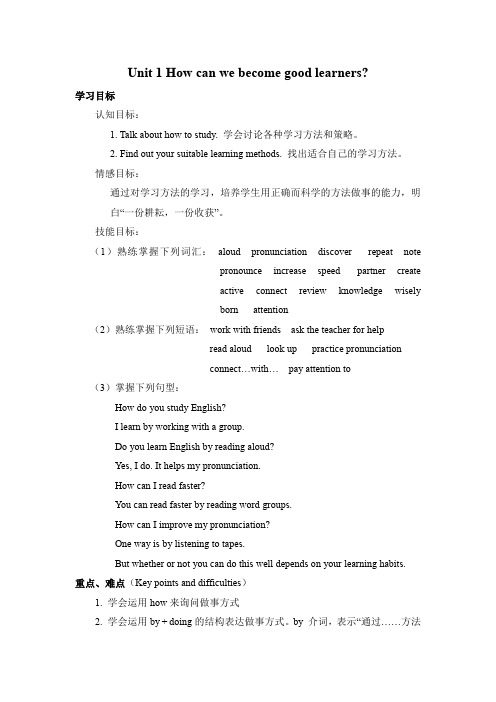
Unit 1 How can we become good learners?学习目标认知目标:1. Talk about how to study. 学会讨论各种学习方法和策略。
2. Find out your suitable learning methods. 找出适合自己的学习方法。
情感目标:通过对学习方法的学习,培养学生用正确而科学的方法做事的能力,明白“一份耕耘,一份收获”。
技能目标:(1)熟练掌握下列词汇:aloud pronunciation discover repeat notepronounce increase speed partner createactive connect review knowledge wiselyborn attention(2)熟练掌握下列短语:work with friends ask the teacher for helpread aloud look up practice pronunciationconnect…with… pay attention to (3)掌握下列句型:How do you study English?I learn by working with a group.Do you learn English by reading aloud?Yes, I do. It helps my pronunciation.How can I read faster?You can read faster by reading word groups.How can I improve my pronunciation?One way is by listening to tapes.But whether or not you can do this well depends on your learning habits.重点、难点(Key points and difficulties)1. 学会运用how来询问做事方式2. 学会运用by + doing的结构表达做事方式。
英语九年级人教版全一册词汇语法集合

英语九年级人教版全一册词汇语法集合Unit 1词汇及语法运用:Textbook n.教科书;课本Repeat v.重复Grammar n.语法Pattern n.模式;方式Speed n.速度Partner n.搭档;伙伴Brain n.大脑Overnight adv..一夜之间Knowledge n.知识Lifelong adj.终生的Conversation n.交谈;对话→have a conversation with sb. 与某人交谈Aloud adv..大声地;出声地→read aloud 大声读speak/talk loudly 大声说;loud adj. loudly adv.. Pronunciation n.发音;读音→have a poor pronunciation 发音差;pronounce v.发音Sentence n.句子→make a sentence 造个句子Patient adj.有耐心的;n.病人→be patient with sb./of sth. 对某人/某事有耐心Expression n.表情;表示;表达方式→express v.表达;展现Express sth. to sb. 向某人表达某事Discover v.发现→Discovery n.发现;discover为发现已存在的事物,invent为发明不存在的事物Secret n.秘密;adj.秘密的→the secret of doing/to do ...的秘密Note n.笔记;v.注意;指出→take a note=take notes 作笔记Pal n.朋友→pen pal 笔友Physics n.物理;物理学→physical adj.物理的Chemistry n.化学→chemical adj.化学的Memorize v.记忆→memory n.记忆Increase v.增加→increase to num. 增加到... increase by num. 增加几倍Born v.出生;adj.天生的→be born with 与生俱来Ability n.能力;才能→have the ability to do/of doing sth. 有做某事的能力Create v.创造→creative adj.具有创造力的creation n.创造品creator n.创造者Active adj.活跃的→activity n.活动activate v.激活;开启Attention n.注意→pay attention to sth./doing sth. 注意某事/做某事Connect v.使连接→connect...with... 把...和...连接或联系起来connection n.联系Review v.复习→review=go overWisely adv..明智地→wise adj.明智重点句式句型语法:How can sb. do sth.?=How to do sth.? 某人如何做某事?By doing sth. 通过做某事make mistakes in doing sth. 做某事犯错Get sth. right 使某事正确look up 向上看;查阅Take an interest in sth./doing sth.=be interested in sth./doing sth. 对某事/做某事感兴趣Be afraid of doing sth. 担心某事会发生be afraid to do sth.害怕做某事Unit 2词汇及语法运用:Mooncake n.月饼Relative n.亲属Pound n.磅;英镑Folk adj.民间的Goddess n.女神Dessert n.甜品Garden n.花园Admire v.仰慕Tie n.领带;v.捆;束Haunted adj.闹鬼的Ghost n.鬼魂Spider n.蜘蛛Novel n.小说Eve n.前夕Whoever pron.无论谁;不管什么人Lantern n.灯笼→the Lantern Festival 元宵节Stranger n.陌生人→strange adj.奇怪的;陌生的Steal v.偷→stole stolen thief n.小偷thievesLay v.放置;下蛋→lay out 摆出Tradition n.传统→the tradition of doing sth. 做某事的传统traditional adj.传统的Trick n.花招;把戏→play a trick on sb. 对某人恶作剧Treat v.招待;n.款待→treat sb. with sth. 用某物招待某人treatment n.待遇Christmas n.圣诞节→Merry Christmas! 圣诞快乐!Lie v.存在;平躺→lay lain lie on 躺在/存在于某物之上Dead adj.死的→die v.死death n.死亡;死神Business n.生意;商业→busy adj.忙的be busy (for) doing sth.Punish v.惩罚→punishment n.惩罚punish sb. for sth. 因某事惩罚某人Warn v.警告→warn sb. (not) to do sth. 警告某人(不要)做某事warning n.警告Present n.现在;礼物;adj.现在的→at present 现阶段;在现在Warmth n.温暖→warm adj.温暖的Spread v.传播;展开;n.蔓延;传播→spread spread重点句式句型语法:Put on 发胖;穿上be crowded with 被..拥挤着dress up as 装扮成End up 最终成为end up doing sth. 以做某事告终end up as 最终成为某种身份warn sb. (not) to do sth. 警告某人(不要)做某事warn sb. of doing sth. 警告某人当心某事treat sb. with sth. 用某物招待某人treat sb. as 将某人看作...at the end of 在...尽头by the end of 在...末尾from beginning to end 从头到尾Shoot sth. 射某物→强调结果shoot at sth. 射某物→强调过程Mean doing sth. 意味着某事mean to do sth. 打算去做某事mean adj.吝啬的Do business with sb. 与某人做生意on business 出差Take sb. back to sw. 带某人回到某地Remind sb. of sth. 使某人想起某事remind sb. to do sth. 使某人想起去做某事Make a promise 做承诺keep a promise 遵守承诺break a promise 食言Promise to do sth. 承诺做某事change one’s life 改变某人的一生What a/an adj.n. (it is). 一个多么怎么样的什么啊!How adj. a/an n. (it is). 一个多么怎么样的什么的!Unit 3词汇及语法运用:Restroom n.洗手间Stamp n.邮票Bookstore n.书店Beside prep.在旁边Postcard n.明信片East adj.东方的/adv.向东/n.东方Washroom n.洗手间Bathroom n.洗手间Staff n.管理人员Grape n.葡萄Nearby adj.附近的/adv.在附近Mail v.邮寄;发电子邮件/n.邮件Inexpensive adj.不昂贵的Uncrowded adj.不拥挤的Mall n.商场Clerk n.职员Direction n.方位Correct adj.正确的Speaker n.发言者Whom pron.谁;什么人Underground adj.地下的/n.地铁Course n.课程;学科Pardon v.原谅/interj.请再说一遍→pardon me=excause me 打扰一下Normally adv.普通地→normal adj.普通的Rush v.仓促/n.急促;仓促→rush to do sth. 急着做某事in a rush 仓促地Suggest v.建议→suggest doing sth. 建议做某事suggestion n.建议Central adj.中央的→center n.中心Fascinating adj.迷人的;极有吸引力的→fascinate v.使..着迷fascinated adj.被吸引的Convenient adj.方便的→convenience n.方便Corner n.拐角→in the corner of 在角落里at the corner of 在拐角处Politely adv.礼貌地→polite adj.礼貌的impolite adj.不礼貌的impolitely adv.不礼貌地Request v.要求/n.要求;请求→request sb. to do sth. 要求某人做某事Direct adj.直率的→directly adv.直率地indirect adj.间接的indirectly adv.间接地Address n.地址→an address重点句式句型语法:Pass by = go past路过pardon me=excause me 打扰一下Be fascinated in = be interested in = take an interest in 对某事着迷Parking lot 停车场ask for help 寻求帮助Practice doing sth. 练习做某事sit by the window 靠着窗户坐The best way to do sth. 做某事的最好方法the most touching 最令人感动的Feel lonely 感到孤独live alone 独自居住Be similar to 与...相似be the same as 与...一样On the 序数词floor = on floor 基数词在第几层楼Example:on the first floor = on floor 1Enjoy doing sth. 享受/喜欢做某事some information 一些信息Spend 时间/金钱[in doing sth. /on sth.] (with sb.)(与某人)[做某事/在某事上]花费多少钱/多长时间A good place to do sth. 一个做某事的好地方礼貌语句例句:Can you tell me how to do sth.?Can you tell me how i can do sth.?Excause me,could you please tell me the way to sw.?Excause me,could you please tell me how to get to sw.?Pardon me,I wonder how to do sth. Pardon me,I wonder how I can do sth.Unit 4词汇及语法运用:Score n.得分;进球/v.得分;进球Background n.背景Interview n.面试;访谈/v.采访General adj.普遍的/n.将军Shyness n.腼腆Crowd n.群众Ton n.吨;大量Private adj.私人的Guard n.守卫Ant n.蚂蚁Insect n.昆虫Examination n.考试Exactly adv.确切地Humorous adj.有幽默感的→humor n.幽默humorist n.诙谐之人Silent adj.寂静的→keep silent = remain silent 保持安静in silence 沉默Deal v.对付→dealt dealt how to deal with = what to do with 如何应付某事Dare v.敢于→dare to do sth. 敢于做某事Require v.需求→require sb. to do sth. 要求某人做某事requirement n.需求Speech n.发言→give a speech 演讲Public n.民众;adj.公众的→in public 公开地Seldom adv.很少→seldom = hardly everInfluence n.影响;v.影响→have/make an influence on sb. 影响某人Absent adj.缺席的→be absent from 缺席某事Fail v.失败;不及格→fail an exam 考试不及格fail to do sth. 失败做某事Pride n.自豪→take pride in = be proud of 为某事自豪be proud to do sth. 自豪做某事Introduction n.介绍→introduce v.介绍introduce sb./sth. to sb. 向某人介绍某人或某物重点句式句型语法:From time to time 时常boarding school 寄宿学校In person 亲身be always doing sth. 总是做某事Cause sb. Sth. = cause sth. to sb. 给某人产生某事cause sb. to do sth. 令某人做某事Used to do sth. 过去常常做某事be/get used to doing sth. 习惯于做某事Be used to do sth. = be used for doing sth. 被用来做某事Unit 5词汇及语法运用:Chopstick n.筷子Coin n.硬币Fork n.叉子Blouse n.女士短上衣Silver n.银/adj.银色的Glass n.玻璃;杯子Cotton n.棉花Steel n.钢铁Fair n.展览会/adj.公平的Environmental adj.自然坏境的Grass n.草Produce v.生产Product n.产品Process v.加工;n.过程Local adj.本地的Pack v.包装;装箱Brand n.牌子Handbag n.手提包Mobile adj.可移动的Boss n.老板Surface n.表面Material n.原料Cap n.(尤指有冒舌的)帽子Glove n.分手指的手套International adj.国际的Its adj.它的Form n.形式Clay n.粘土Celebration n.庆典Balloon n.气球Scissors n.剪刀Lively adj.生动的Polish v.磨光;修改;润色Leaf n.叶子→leaves 复数形式Widely adv.广泛的→wide adj.宽的Avoid v.避免→avoid doing sth. 避免做某事Everyday adj.每天的→every day adv.每天Traffic n.交通→heavy/busy traffic 交通繁忙Postman n.邮递员→postmen 复数形式Competitor n.竞赛者→compete v.竞赛competition n.竞赛Historical adj.历史的→history n.历史historian n.史学家Heat n.高温/v.加热→at a very high heat/temperature 在高温下Complete v.完成/adj.完整的→completely adv.完整地重点句式句型语法:Be known for 原因= be famous for 原因因什么而出名Be known as 身份= be famous as 身份因某种身份地位而出名No matter 无论no matter what/when/who = whatever/whenever/whoeverPaper cutting 剪纸fairy tale 童话故事objects of beauty 精美的物品Lively adj.生动的用于修饰人和物living adj.活着的多用于修饰物Live adj.活的只用于修饰物alive adj.活着的多用于修饰人Be done (by somebody) 为被动语态的结构,译为被(某人)怎么了Made of sth. 由某物制成(可以看出原料) be made from sth. 由某物制成(看不出原料)Unit 6词汇及语法运用:Heel n.鞋跟Project n.项目Zipper n.拉链Daily adj.日常的Website n.网页Accidental adj.意外的Nearly adv.几乎;差不多Ruler n.统治者Remain v.剩余;保持不变Saint n.圣徒National adj.国家的Doubt n.疑问/v.怀疑Fridge n.冰箱Somebody pron.某人/n.重要人物Earthquake n.地震Sudden adj.突然的Biscuit n.饼干Cookie n.曲奇饼Instrument n.工具;器械Crispy adj.脆的Sour adj.酸的Divide v.分开;分散Basket n.蓝;筐Hero n.英雄Electricity n.电力→run on electricity 电力工作Style n.样式→out of style 过时in style 时髦the style of 什么的款式Scoop n.勺子→a scoop of 一勺的Pioneer n.先驱→the pioneer of 什么的先驱List n.列表;清单/v.列表→make a list 列一个清单Mention v.提到→mention doing sth. 提到做某事Boil v.煮沸→boiled water 开水boiling water 沸水Smell n.气味/v.闻到→smelt smeltTrade n.贸易/v.做生意→trader n.商人Low adj.低的→at a low/high price 低/高价Translate v.翻译→translator n.翻译家translation n.翻译Lock n.锁子/v.锁上→unlock v.解锁Bell n.钟声→bell v.响铃Musical adj.有关音乐的→music n.音乐musician n.音乐家Salty adj.咸的→salt n.盐Popularity n.普及→the popularity of sth. has rise n.什么的普及得到提升Professional adj.专业的→profession n.专业professor n.教授Invent v.发明→invention n.发明inventor n.发明家重点句式句型语法:Have a point 有道理by accident 意外地by mistake 错误地Take place = happen 发生take place指有计划地发生事件,happen则是偶然发生事件Without doubt = no doubt 毫无疑问地Translate A into language. 将A翻译成某种语言All of a sudden = suddenly 突然地The Olympics 奥林匹克运动会Divide ...... Into 把......分开Not only...but also 不仅...而且but also后面若跟动词,则动词的形式看but also之后的名词的单复数Look up to 仰慕Do/does/did+动词原形在实意动词前面用do.does或did表示强调,确定Unit 7词汇及语法运用:License n.证件Smoke n.烟/v.抽烟Pierce v.扎Part-time adj.兼职的/adv.兼职地Earring n.耳环Flash n.闪光灯/v.闪耀Tiny adj.极小的Cry n.哭/v.哭Filed n.田野;场地Hug n.拥抱/v.拥抱Lift v.举起/n.电梯;搭便车Badly adv.严重地;差Awful adj.讨厌的Community n.社区Support n.支持/v.支持Safety n.安全→safe adj.安全的safely adv.安全地Teen n.青少年→teenager n.青少年teenage adj.青年的Regret v.后悔→regret doing sth. 后悔做某事regret to do sth. 后悔没做某事Poem n.诗→poet n.诗人Chance n.机会→a chance to do sth. = a chance of doing sth. 一个做某事的机会Educate v.教育→educate sb. to do sth. 教育某人做某事education n.教育educator n.教育家educational adj.有教育意义的Manage v.完成→manage to do sth. 完成做某事manager n.管理者management n.完成Society n.社会→social adj.社会的Enter v.进入→enter university 进入大学Choice n.选择→have no choice but to do sth. 除了做某事别无选择重点句式句型语法:Get one’s ears pierced 扎耳洞Give sb. a lift = give sb. a ride 捎某人一程Talk back to sb. 跟某人顶嘴Keep ... away from 使...远离Make one’s own decision = make a decision for oneself 自己做决定Get in the way of 阻碍No way 没门含有情态动词的被动语态中,be动词不需要被还原:情态动词+be+动词的过去分词Only then will I...中will放于i前面为倒装结构,用于强调Unit 8词汇及语法运用:Whose adj.谁的/pron.谁的Truck n.卡车Rabbit n.兔子Attend v.出席Valuable adj.珍贵的Pink adj.粉红的Anybody pron.任何人Happening n.事件Uneasy adj.担心的;不安的Enemy n.敌人Laboratory n.实验室Coat n.大衣Sleepy adj.瞌睡的Alien n.外星人Suit n.西装/v.合适Hard-working adj.工作努力的Circle n.圆圈/v.画个圈Mystery n.神秘Leader n.领导人Midsummer n.仲夏Position n.地方Burial n.埋葬Honor n.荣幸/v.尊重Ancestor n.祖先Victory n.胜利Noise n.噪音→noisy adj.吵闹的noisily adv.吵闹地make noises 制造噪音Picnic n.野餐→have a picnic = go for a picnic 去吃野餐Policeman n.警察→policemen 复数形式Wolf n.狼→wolves 复数形式Outdoors adv.在室外→indoors adv.在室内Land v.着陆→land on 着陆→take off 起飞Receive v.接受→receive a letter from sb. = hear from sb. 收到来信Medical adj.医学的→medicine n.药Purpose n.目标→the purpose of 什么的目标Prevent v.阻止→prevent sb./sth. from sth. 从某事上阻止某人某物Energy n.能量→energetic adj.精力充沛的Period n.时期→a period of time 一段时间重点句式句型语法:Run after 追逐At the same time 同时Be valuable for/to sb. 对某人珍贵Sth. be worth doing sth. 某物值得做某事Belong to sb. = be one’s 属于某人Whose sth. it is? = who’s the owner of sth. ? 这是谁的?Unit 9词汇及语法运用:Lyrics n.歌词Smooth adj.悦耳的Director n.导演Case n.情况War n.战争Down adj.沮丧的Dialog n.对话Ending n.结局Documentary n.纪录片Drama n.剧Superhero n.超级英雄Intelligent adj.有才智的Sadness n.悲哀Pain n.痛苦Reflect v.反映Pity n.遗憾/v.怜悯;同情Master n.大师;主人/v.精通Recall v.回忆起Wound n.伤口/v.使受伤Prefer v.更喜欢→prefer A(sth./doing sth.) to B(sth./doing sth.) 比起B更喜欢APrefer to do sth.(A) rather than do sth.(B) 比起做某事B更喜欢做某事APrefer = like betterElectronic adj.电子的→electric adj.电力工作的Suppose v.推断;料想→suppose to do sth. 预料做某事Spare adj.空闲的/v.抽出→in one’s spare time 在某人的空闲时间Stick v.粘贴;将...刺入→stick ... Into 将...插入stick to sth./doing sth. 坚持某事/做某事Plenty pron.大量→plenty of = a lot of = lots of 大量的Shut v.关闭→shut shut shut off 关闭Sense n.意识/v.感觉到→sense = realize 意识到Moving adj.动人的→move adj.被感动的Perform v.表演;执行→performance n.表演performer n.表演者Lifetime n.有生之年→in one’s lifetime = during one’s lifetime 在某人的有生之年Total adj.总的/n.总数→totally adv.总地Praise v.表扬→praise sb./sth for sth. 因某事表扬某人/某物重点句式句型语法:In that case 既然那样in good case 情况良好Once in a while 偶尔地dance to = dance along with 与...跳舞Live a/an adj. life = lead a/an adj. life. 过着某种生活A long week at work 工作繁忙的一周在宾语从句和定语从句中,从句的语序为一般陈述句的语序,相关的词有that,if,whether,what,who,where,why和how等.例句:I like music that I can dance to.Do you like films that are scary?Unit 10词汇及语法运用:Bow v.鞠躬Relaxed adj.放松的Noon n.正午Passport n.护照Chalk n.粉笔Blackboard n.黑板Northern adj.北方的Coast n.海岸Season n.季节Eastern adj.东方的Empty adj.空的Except prep.除...之外/conj.除了;只是Elbow n.胳膊Gradually adv.逐步地Custom n.风俗→a custom to do sth. 做某事是风俗keep a custom 遵守风俗break a custom 破坏风俗Kiss n.吻/v.吻→kiss sb. = give sb. a kiss 亲吻某人Greet v.迎接→greet sb. with sth. 用某物迎接某人Value n.价值/v.珍惜→be of value to do sth. 有很大的价值去做某事Capital n.首都→the capital of ...的首都Mad adj.生气的→get/be mad at sb. = be angry with sb.生某人的气get/be mad about/on sth. 生某事的气Effort n.努力→make an effort to do sth. 努力做某事Knock n.敲击声/v.敲→knock at/on sth. 敲某物Worth adj.值得;有...价值的→be worth doing sth. 有做某事的价值Manner n.方式;礼仪→table manners 餐桌礼仪have good/bad manner(manners) 有好/坏方法(礼仪)Basic adj.基础的→base n.基础/v.以...为基础Exchange n.交换/v.交换→exchange A for B 用A换B exchange sth. with sb. 用某物跟某人换Granddaughter n.孙女→grandson n.孙子Behave v.表现→behavior n.行为重点句式句型语法:Drop by 顺便访问After all 毕竟Clean ... off 把...擦掉Take off 起飞land on 着陆Go out of one’s way to do sth. 格外努力的做某事Make ... feel at home 使...感到宾至如归The wrong way 以错误的方式Be supposed to do sth. = be expected to do sth. = should do sth. 应该做某事At table 在进餐at the table 在桌边at school 上学at the school 在学校In hospital 住院in the hospital 在医院in class 上课in the class 在教室Unit 11词汇及语法运用:Lately adv.最近King n.国王Power n.力量;权力Prime adj.首要的;基本的Minister n.大臣;部长Banker n.银行家Pale adj.苍白的Queen n.女王Nor Conj.也不/adv.也不Palace n.供电Wealth n.财富Grey adj.灰色的Lemon n.柠檬Uncomfortable adj.不舒服的Goal n.球门;得分Coach n.家教;私人教练Besides adv.而且Teammate n.队友Courage n.勇气Guy n.家伙Fault n.过失;缺点Disappoint v.使...失望Rather adv.相当;相反→would rather = ‘d rather 宁愿would rather do sth. than do sth. = prefer to do sth. than do sth.比起做某事,宁愿做某事Drive v.迫使→drive sb. crazy/mad 使某人发疯drive sb. to do sth. 逼迫某人做某事Friendship n.友谊→break friendship with sb. 与某人绝交Fame n.名誉→famous adj.出名的Examine v.检验→examine one’s own heart = examine oneself 反省Weight n.重量→lose weight 减肥Shoulder n .肩膀→shoulder to shoulder 肩并肩Kick v.踢→kick sb. off 开除某人Pull v.拉→pull together 齐心协力push v.推Relief n.轻松→to one’s relief 令某人轻松的是Nod v.点头→nod at/to sb. 对某人点头Agreement n.同意→in agreement with sb. 与某人意见一致重点句式句型语法:Be friend with sb. 与某人成为朋友Leave out 忽略leave for 出发去...Prime minister 首相Call in 召来Neither ... nor ... 既不...也不... 该句中的谓语动词的形式与最近的名词的形式一致To start with 起初Let ... down 使...失望Be hard on sb. = be strict with sb. 对某人严格Be adj. doing sth. 怎么样地做着某事在被动语态中,原本省to加动词的动词需要恢复to.例句:hear sb. do sth. →be heard to do sth.常见的有:hear.watch.notice.feel.seeMake sb./sth. do sth. 使某人/某物做某事make sb./sth. adj.使某人/某物怎么样Unit 12词汇及语法运用:Unexpected adj.出乎意料的Backpack n.背包Ring v.响铃Disappear v.消失Block n.街区Worker n.工人Stare v.盯着看Disbelief n.不信Above prep.在...上面/adv.在上面Burn v.燃烧Burning adj.燃烧的Airport n.机场West adv.向西/adj.西方的/n.西方Cream n.奶油Workday n.工作日Pie n.派Bean n.豆Market n.市场Fool n.傻瓜/v.愚弄Costume n.服装Embarrassed adj.窘迫的Embarrassing adj.使人窘迫的Announce v.发言Spaghetti n.意大利面Hoax n.骗局Discovery n.发现Lady n.女士Cancel v.取消Officer n.军官Believable adj.可信的Oversleep v.睡过头→overslept oversleptTill prep.直到/conj.直到→till = until 直到重点句式句型语法:By the time ... 在...以前By the end of 在(某时间点)之前In line with 与...成一排Show up 出现Costume party 化妆舞会Sell out 卖光At the invitation of 应某人之邀Accept/refuse an invitation 接受/拒绝邀请Invite sb. to sw. 邀某人去某地invite sb. to do sth. 邀某人做某事过去完成时表示在过去某一时间或动作之前已经发生或完成了的动作,结构为:Had done. 常见的关联词有by the time,by the end of等,也可用when,before等引导的语句和上下文表示。
- 1、下载文档前请自行甄别文档内容的完整性,平台不提供额外的编辑、内容补充、找答案等附加服务。
- 2、"仅部分预览"的文档,不可在线预览部分如存在完整性等问题,可反馈申请退款(可完整预览的文档不适用该条件!)。
- 3、如文档侵犯您的权益,请联系客服反馈,我们会尽快为您处理(人工客服工作时间:9:00-18:30)。
人教版初中英语九年级全一册语法知识点汇总
动词
1.被动语态(passive voice)
(1)主动语态和被动语态
英语动词有两种语态,即主动语态(active voice)和被动语态(passive voice)。
当主语为动作的执行者时,谓语的形式为主动语态;当主语为动作的承受者时,谓语要用被动语态。
【练习】:判断下列句子为主动句还是被动句,并找出该动作的执行者和承受者。
Many people speak English.
Bell invented the telephone in 1876.
English is spoken by many people.
The telephone was invented by Bell in 1876.
(2)被动语态的构成
被动语态由“助动词be+及物动词的过去分词”构成。
助动词be有人称、数和时态的变化,其变化规则与be作为连系动词时完全一样。
现以动词ask为例,将一般现在时和一般过去时被动语态的肯定式、否定式及疑问式列表如下:
(3)含有情态动词的被动语态
含有情态动词的被动语态由“情态动词+ Be + 及物动词的过去分词”构成。
Your room must be cleaned every day.
The trees may be planted behind the house.
This game can be played in the winter.
(4)被动语态的用法
当我们不知道谁是动作的执行者、或者没有必要说明谁是动作的执行者,或者只需强调动作的承受者时,要用被动语态。
The blouse is made of silk.
The zipper is often used in our daily lives.
I think the TV was invented after the car.
2.过去完成时(past perfect tense)*
(1)过去完成时的构成:助动词had(用于各种人称和数) + 过去分词
(2)过去完成时的用法
过去完成时表示在过去某一时间或动作之前已经发生或完成了的动作。
它表示动作发生的时间是“过去的过去”。
表示过去某一时间可用by, before 等构成的短语,也可用when, before 等引导的从句,或者通过上下文表示。
By the time I got outside, the bus had already left.
When I got to the school, I realized I had left my backpack at home.
The movie had started before I arrived at the cinema.
By the time I got to the airport, my flight had already taken off.
3.情态动词(modal verbs)
很多情态动词都可以表示推测,但所办含的意义不尽相同。
(1)must
must 表示很大的可能性,意为“一定;必定”,只用于肯定句中。
The backpack must belong to Carla.
It’s 10:00 p.m. He must be at home by now.
(2)can 和can't
can 常用于否定句或疑问句中表示惊异、疑问、不相信等。
can't表示“不大可能”。
Can it be true?
What can he mean?
He can’t be more than 40.
I trust Joe. He can’t be lying.
除上述情态动词外,may,might,could都能表示“可能”。
could ,might 语气更加委婉,might语气最为缓和,含义更不确定。
如:
She looks beautiful. I think she may be an actress.
It could be Mei’s hair band. Or it might belong to Linda. They both have long hair.
宾语从句(Objective Clauses)
在复合句中,由一个句子充当宾语,这个句子就叫做宾语从句,引导宾语从句的常见关联词由that, if , whether, what, who, where, why, how等。
定语从句(Attributive Clauses)
在复合句中,修饰某一名词或代词的从句叫做定语从句。
定语从句通常置于它修饰的名词或代词之后,被修饰的名词或代词叫先行词。
例如: I like music that I can dance to.
Carmen likes musicians who play different kinds of music.
上面两句中的music 和musicians 是定语从句所修饰的词,叫做先行词,定语从句放在先行词的后面。
引导定语从句的词由关系代词that,which,who(宾格whom,所有格whose)和关系副词where,when,why.关系代词和关系副词放在先行词和定语从句之间,起联系作用,同时又作定语从句的一个成分。
由关系代词引导的定语从句:
注释:关系代词在句中作宾语时常可省略。
构词法(Word Formation)
英语中很多单词的构成形式是有规律的,掌握单词的构成规律有助于理解和记忆词汇。
英语常见的构词法有合成、派生和转化。
缩写和简写也是构词法的一种。
1.合成法(Compounding)
由两个或两个以上的词合成一个新词,这种构词法叫做合成法。
例如:
classroom blackboard worldwide good-looking overcome fifty-four everything downstairs
2.派生法(Derivation)
在一个单词前面或后面加上一个词缀构成新词,这种构词法叫做派生法。
加在单词前面的词缀叫前缀,加在后面的词缀叫后缀。
【练习】:请找出下列单词的词缀,在其下方画横线.
actor singer artist tourist Chinese attraction helpless talented natural careless balanced driver
unfriendly exciting really unpleasant cloudy uncomfortable successful invitation friendly
terrorist beautiful disadvantage funny dishonest disagree
bicycle interesting international comfortable homeless
Japanese
interview healthy Internet finally worker
review population return relaxed review
telephone outstanding scientist television usually
runner surprised traditional boring visitor
3.转化法(Conversion)
一个单词由一种词类转换为另一种词类,这种构词法叫转化法。
单词转化后的意义往往与之前的意义联系紧密。
4.缩写和简写(Abbreviation and Simplification)
缩写和简写(也被称为截断法或缩短法),主要采取“截头”“去尾”或者“既截头又去尾”的方式来生成新词。
例如:
telephone---phone airplane ---plane laboratory----lab mathematics ---math advertisement --- ad examination--- exam influenza--- flu
CD: compact disk
CCTV : China Central Television
NBA: National Basketball Association
UFO: unidentified flying object
UN: United Nations
USA: United States of America
WWF: World Wide Fund for Nature or World Wildlife Fund。
